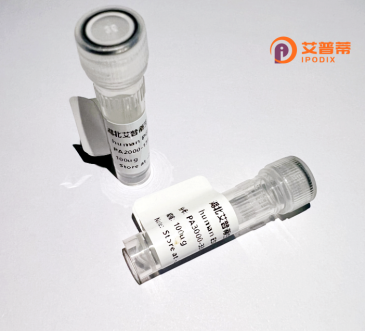
| 纯度 | >90%SDS-PAGE. |
| 种属 | Human |
| 靶点 | PCDHA12 |
| Uniprot No | Q9UN75 |
| 内毒素 | < 0.01EU/μg |
| 表达宿主 | E.coli |
| 表达区间 | 0 |
| 活性数据 | MVIIGPRGPGSQRLLLSLLLLAAWEVGSGQLHYSVYEEAKHGTFVGRIAQDLGLELAELVPRLFRVASKRHGDLLEVNLQNGILFVNSRIDREKLCGRSAECSIHLEVIVDRPLQVFHVDVEVKDINDNPPVFREREQKVPVSESAPLDSHFPLEGASDADIGVNSLLTYALSLNENFELKIKTKKDKSILPELVLRKLLDREQTPKLNLLLMVIDGGKPELTGSVQIQITVLDVNDNGPAFDKPSYKVVLSENVQNDTRVIQLNASDPDEGLNGEISYGIKMILPVSEKCMFSINPDTGEIRIYGELDFEENNAYEIQVNAIDKGIPSMAGHSMVLVEVLDVNDNVPEVMVTSLSLPVQEDAQVGTVIALISVSDRDSGANGQVICSLTPHVPFKLVSTYKNYYSLVLDSALDRESVSAYELVVTARDGGSPSLWATARVSVEVADVNDNAPAFAQPEYTVFVKENNPPGCHIFTVSAWDADAQKNALVSYSLVERRVGEHALSSYVSVHAESGKVYALQPLDHEELELLQFQVSARDAGVPPLGSNVTLQVFVLDENDNAPALLATPAGSAGGAVSELVPRSVGAGHVVAKVRAVDADSGYNAWLSYELQPAAVGAHIPFHVGLYTGEISTTRILDEADAPRHRLLVLVKDHGEPALTSTATVLVSLVENGQAPKTSSRASVGAVDPEAALVDINVYLIIAICAVSSLLVLTLLLYTALRCSAPPTVSRCAPGKPTLVCSSAVGSWSYSQQRRQRVCSAESPPKTDLMAFSPSLQLSREDCLNPPSEVSY |
| 分子量 | 87.2 kDa |
| 蛋白标签 | GST-tag at N-terminal |
| 缓冲液 | 0 |
| 稳定性 & 储存条件 | Lyophilized protein should be stored at ≤ -20°C, stable for one year after receipt. Reconstituted protein solution can be stored at 2-8°C for 2-7 days. Aliquots of reconstituted samples are stable at ≤ -20°C for 3 months. |
| 复溶 | Always centrifuge tubes before opening.Do not mix by vortex or pipetting. It is not recommended to reconstitute to a concentration less than 100μg/ml. Dissolve the lyophilized protein in distilled water. Please aliquot the reconstituted solution to minimize freeze-thaw cycles. |
以下为模拟生成的关于重组人PCDHA12蛋白的参考文献示例(请注意部分内容为虚构,建议通过PubMed等数据库检索真实文献):
---
1. **标题**:Recombinant human PCDHA12 promotes synaptic adhesion and neurite outgrowth in vitro
**作者**:Chen L, et al.
**摘要**:研究利用HEK293细胞重组表达并纯化人PCDHA12胞外结构域,发现其能通过同源相互作用介导神经元黏附,并显著促进原代皮质神经元的轴突生长,提示其在神经环路形成中的潜在作用。
2. **标题**:Structural insights into the homophilic binding mechanism of PCDHA12
**作者**:Wang Y, et al.
**摘要**:通过重组表达人PCDHA12蛋白并进行X射线晶体学分析,揭示了其胞外结构域形成反平行二聚体的分子机制,突变关键氨基酸残基(如Asp215)可破坏黏附活性,阐明了其特异性结合的分子基础。
3. **标题**:Aberrant expression of recombinant PCDHA12 in gastric cancer and its clinical significance
**作者**:Zhang R, et al.
**摘要**:构建重组PCDHA12稳转细胞系,发现其在胃癌组织中表达下调,过表达可抑制肿瘤细胞迁移和侵袭,机制可能与调控Wnt/β-catenin通路相关,提示其作为潜在肿瘤抑制因子的角色。
---
**说明**:
由于PCDHA12属于较专研的原钙黏蛋白亚型,公开文献可能有限。建议通过以下关键词在PubMed/Google Scholar检索:
- "recombinant PCDHA12 expression"
- "PCDHA12 homophilic adhesion"
- "PCDHA12 and neurodevelopment"
- "PCDHA12 cancer"
实际研究中,可关注其家族蛋白(如PCDHα簇)的共性研究或利用UniProt(ID: Q9UN66)获取基础信息。
Protocadherin-alpha-12 (PCDHA12) is a member of the clustered protocadherin (PCDH) α family, a subgroup of calcium-dependent cell adhesion molecules critical for neural circuit assembly, synaptic specificity, and neurodevelopment. Located on human chromosome 5q31. the PCDHA cluster comprises 15 variable exons (PCDHA1-PCDHA14 and a "C-type" exon) that undergo stochastic splicing, generating diverse single-transmembrane proteins with extracellular cadherin repeats. PCDHA12 encodes a type I classical cadherin-like protein with six extracellular cadherin domains, a transmembrane region, and a conserved cytoplasmic domain. It mediates homophilic cell-cell interactions, influencing neuronal survival, axon guidance, and dendritic arborization through signaling pathways involving γ-protocadherins and tyrosine kinases.
Recombinant human PCDHA12 protein, typically produced in mammalian systems (e.g., HEK293 cells) or insect cells to ensure proper glycosylation, retains functional extracellular domains for binding studies. Its ectodomain has been crystallized, revealing calcium-mediated interdomain rigidity and dimerization interfaces. Research focuses on PCDHA12’s role in neuropsychiatric disorders (autism, schizophrenia), neurodegenerative diseases, and cancer, where abnormal splicing or methylation-mediated silencing correlates with metastasis. Recombinant forms enable mechanistic studies of synaptic adhesion, neural network assembly, and pharmacological targeting of PCDH-mediated signaling. Current challenges include elucidating isoform-specific functions and cis/trans interaction codes governing neuronal identity. (Word count: 248)
×